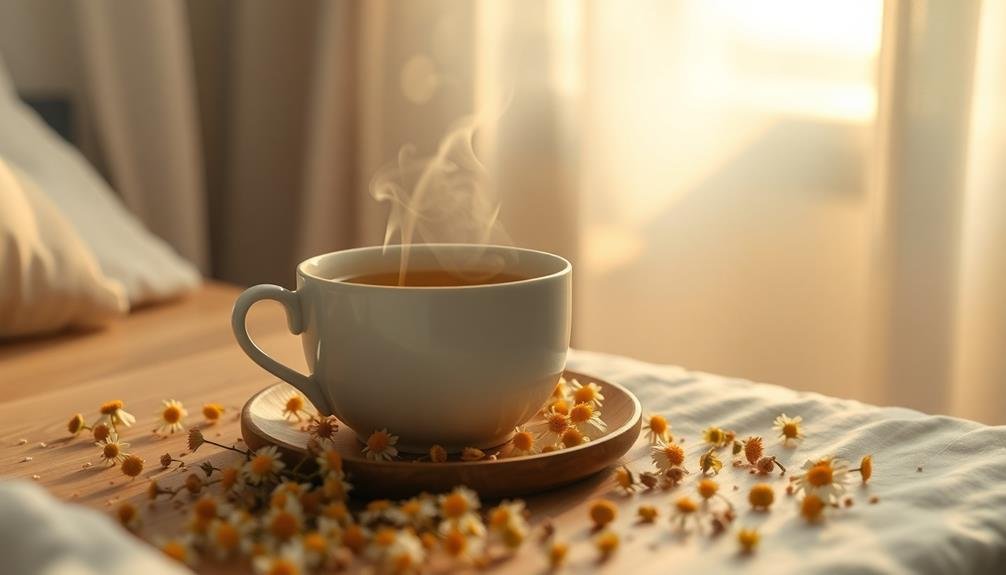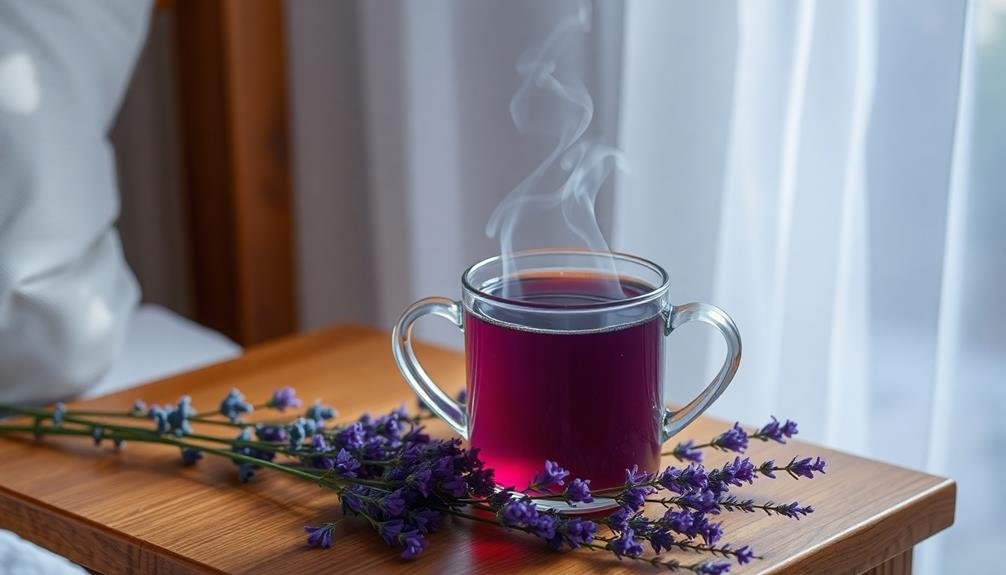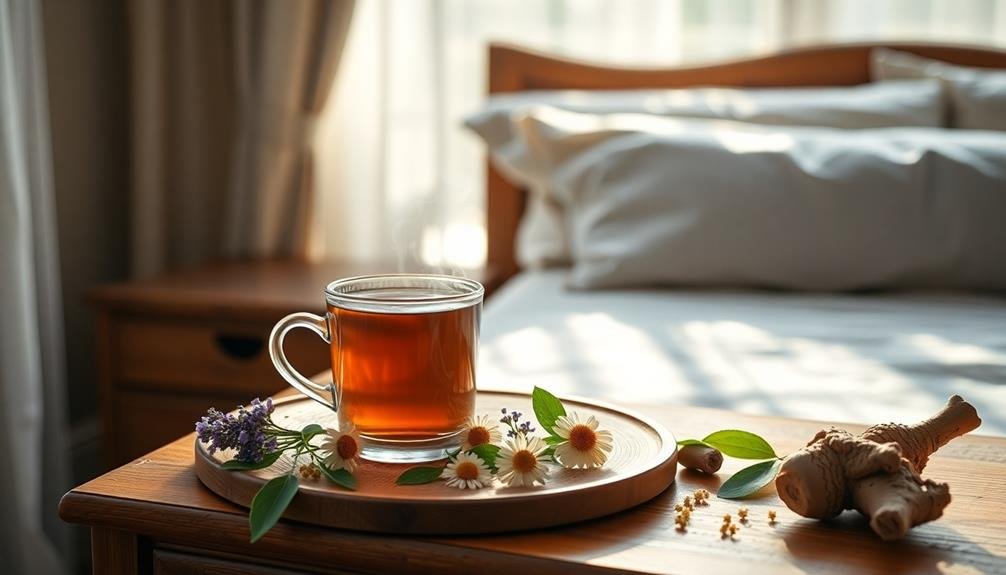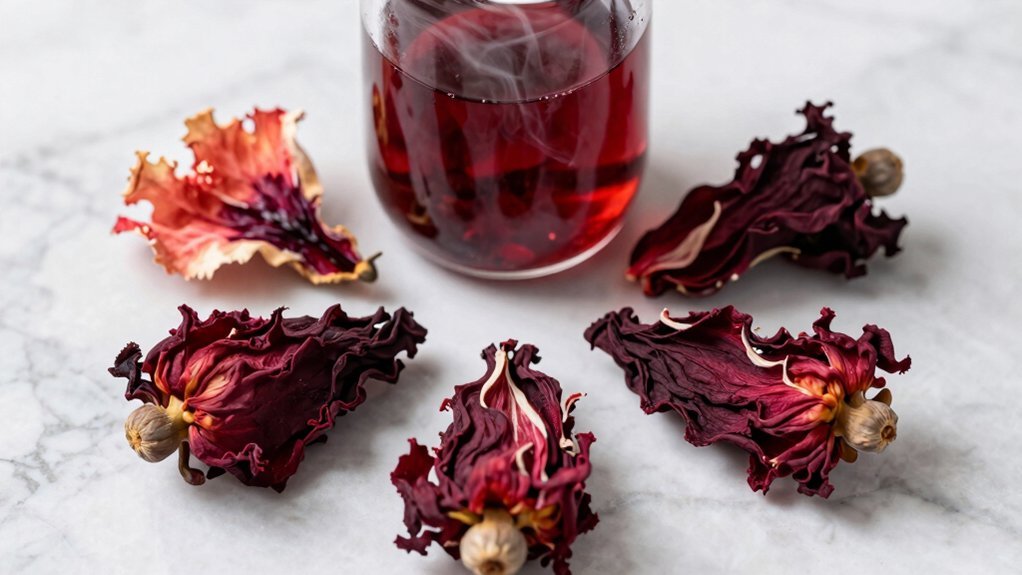For your ultimate bedtime tea blend, consider these three powerful herbs: chamomile, valerian root, and lavender. Chamomile, nature's sleep inducer, contains apigenin that binds to brain receptors, promoting relaxation and improving sleep quality. Valerian root acts as a natural sedative, increasing GABA levels in the brain to reduce stress and combat insomnia. Lavender's calming aromatherapy effects stimulate the limbic system, quieting racing thoughts and preparing you for sleep. When combined, these herbs create a potent blend to enhance your overall sleep patterns and daytime functioning. Discover how to harness the full potential of these sleep-inducing herbs for your perfect nighttime routine.
Chamomile: Nature's Sleep Inducer

Out of all the herbs used for bedtime teas, chamomile stands out as nature's premier sleep inducer. This daisy-like flower has been used for centuries to promote relaxation and improve sleep quality. When you brew chamomile tea, you're tapping into its potent sedative properties, which can help calm your nerves and ease you into a restful slumber.
Chamomile contains apigenin, a flavonoid that binds to specific receptors in your brain, potentially reducing anxiety and initiating sleep. It's also known for its mild antidepressant effects, which can be particularly beneficial if stress or worry is keeping you awake at night.
You'll find that regular consumption of chamomile tea may improve your overall sleep patterns and daytime functioning.
To get the most out of your chamomile tea, steep it for about 5 minutes in hot water. You can enhance its effects by combining it with other sleep-promoting herbs like lavender or valerian root.
Valerian Root for Deep Relaxation
Delving into the world of herbal sleep aids, we can't overlook valerian root's powerful impact on deep relaxation. This herb has been used for centuries to combat insomnia and anxiety. When you brew valerian root tea, you're tapping into a natural sedative that can help you fall asleep faster and improve your overall sleep quality.
Valerian root works by increasing the levels of gamma-aminobutyric acid (GABA) in your brain. GABA is a neurotransmitter that helps regulate nerve impulses, promoting calmness and reducing stress. As you sip your valerian tea, you'll likely notice a gradual onset of drowsiness and muscle relaxation.
While valerian root is generally safe, it's important to use it responsibly. Start with a small amount and gradually increase if needed. You might experience mild side effects like headaches or stomach upset, but these are typically rare.
It's best to avoid valerian if you're pregnant, nursing, or taking certain medications. Always consult your healthcare provider before adding new herbs to your routine, especially if you have existing health conditions or are taking other sleep aids.
Lavender's Calming Aromatherapy Effects

While valerian root works internally to promote relaxation, lavender offers a different approach through its calming aromatherapy effects. When you add lavender to your bedtime tea, you're not just creating a pleasant flavor; you're also harnessing the power of its soothing scent. As you sip your tea, the aroma of lavender wafts up, triggering a relaxation response in your brain.
Lavender's calming properties have been well-documented in scientific studies. It's been shown to reduce anxiety, improve sleep quality, and even lower heart rate and blood pressure. When you inhale lavender's scent, it stimulates the limbic system, which is responsible for emotions and memory. This interaction can help quiet your racing thoughts and prepare your mind for sleep.
To maximize lavender's benefits in your bedtime tea, use fresh or dried lavender buds rather than essential oils. Steep them along with your other herbs for about 5 minutes. You'll notice the delicate floral aroma filling your space, creating a tranquil atmosphere.
For an extra boost, try placing a small sachet of lavender near your pillow to continue the aromatherapy effects throughout the night.
Frequently Asked Questions
Can Herbal Teas Interact With Sleep Medications?
Yes, herbal teas can interact with sleep medications. You should always consult your doctor before combining them. Some herbs might enhance or interfere with your sleep meds, potentially causing unwanted side effects or reducing their effectiveness.
How Long Before Bedtime Should I Drink My Herbal Tea?
You'll want to drink your herbal tea about 30-60 minutes before bedtime. This gives your body time to absorb the beneficial compounds and allows you to use the bathroom before sleep if needed.
Are There Any Side Effects of Drinking Herbal Teas Regularly?
While herbal teas are generally safe, you should be aware of potential side effects. You might experience allergic reactions, interactions with medications, or digestive issues. It's best to consult your doctor if you're drinking them regularly or have health concerns.
Can I Mix Different Herbs to Create a Custom Sleep Blend?
Yes, you can mix different herbs to create a custom sleep blend. You'll want to experiment with combinations that work best for you. Try mixing calming herbs like chamomile, lavender, and valerian root for a soothing nighttime tea.
Are These Herbal Teas Safe for Pregnant Women or Nursing Mothers?
You should be cautious with herbal teas during pregnancy or while nursing. Some herbs can be harmful to you or your baby. Always consult your healthcare provider before consuming any herbal teas in these conditions.
In Summary
You've now discovered three powerful herbs to enhance your bedtime routine. By blending chamomile, valerian root, and lavender, you're creating a potent sleep-inducing brew. Don't hesitate to experiment with different ratios to find your perfect mix. Remember, consistency is key – make this tea a nightly ritual. As you sip your custom blend, you'll be embracing nature's gift for better sleep. Sweet dreams await you with these herbal allies by your side.





Leave a Reply